Graham Reid | | 7 min read
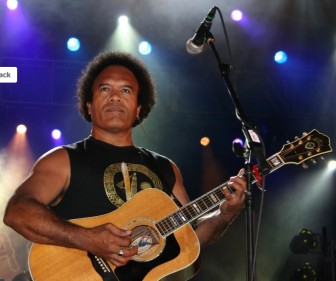
From the semi-rural side street, the home of Opetaia and Julie Foa'i in Laingholm is unremarkable other than for its size. It sprawls across the property and boasts a high A-frame, but other than that you would drive past without a second glance.
However, this is the spiritual home and business centre of Te Vaka, Auckland's pan-Polynesian group whose celebratory and exotic performances of Opetaia's original music have won a global audience.
The group's first album in '97 was released in 80 countries, the following year they appeared at the prestigious South by South West music festival in Texas, and brought in the new millennium at Okahu Bay in Auckland.
Their videos are played in Europe, in '99 they performed at Apec in Auckland and had United States Secretary of State Madeleine Albright up dancing. At the invitation of Greenpeace and other environmental groups they took part in demonstrations in The Hague in 2000 to protest against global warming.
The photographs in the Foa'i kitchen tell stories: here members of the group are with Peter Gabriel and Ringo Starr, over there pictured performing before a crowd of 60,000 at a festival in Spain. Behind a door off the kitchen is the state-of-the-art recording studio, decked out in memorabilia and tapa where their blend of traditional and contemporary Pacific sounds is crafted to radio-friendly perfection.
It was at this ordinary kitchen table seven years ago Julie put a piece of paper in front of her husband and three musicians in the nascent Te Vaka which read, "Target: take this music to the world".
"We looked at each other and thought, 'This lady's crazy'," laughs Opetaia.
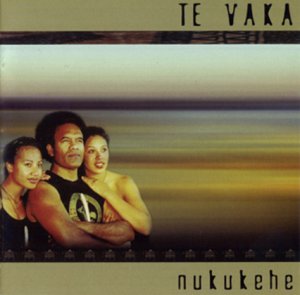 But that's what they have
done, with Julie as astute business manager and Opetaia helming the
music and performances. They have played Womad world music festivals
and open-air rock bills in Germany, appeared at Ronnie Scott's club
and the Royal Festival Hall in London, and at a jazz festival in
Estonia. They have performed in 26 countries, some of them twice.
But that's what they have
done, with Julie as astute business manager and Opetaia helming the
music and performances. They have played Womad world music festivals
and open-air rock bills in Germany, appeared at Ronnie Scott's club
and the Royal Festival Hall in London, and at a jazz festival in
Estonia. They have performed in 26 countries, some of them twice.
They are world famous but the place they seem least well known is at home. They perform here rarely, their most recent album - the excellent Nukukehe - has barely been reviewed locally (although it was given five stars in the Herald a month ago), and they won't be seen live here until end of year.
They offer a twist on the familiar saying: Te Vaka are world famous - except in New Zealand.
While Te Vaka perform original Pacific music and have a finely honed and professional stage presentation, that doesn't guarantee a hometown audience. But the rest of the world, where they have spent three to five months every year since '97, has consistently acclaimed them.
"My goal," says Opetaia, "was to write material which was something to do with the Pacific and to tell the [Pacific] story. It was always aimed at Europe because they seemed to understand immediately what we were doing.
"Maybe it was too familiar in this area. People would go, 'Huh, what do you want to do that for?' That was the attitude here."
There were also some negative comments within some Polynesian circles that he was mixing different Pacific cultures, but for the Apia-born, Auckland-raised musician whose ancestry is in Tokelau and Tuvalu, this seemed natural. Te Vaka, which means "the canoe" in Tokelau, and is a metaphor for their ideology, was the vehicle to present Pacific stories.
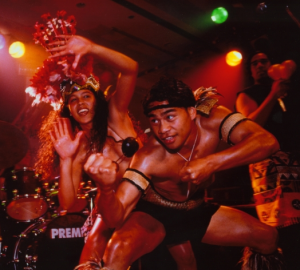 Te Vaka's international
appeal is obvious: handsome bare-chested Polynesian men and
attractive Polynesian women in coconut-shell bras singing and playing
memorable Pasifika music and delivering a vibrant stage show. Under
sullen European skies this breathes the exoticism of the South
Pacific and Te Vaka use that to get a message across.
Te Vaka's international
appeal is obvious: handsome bare-chested Polynesian men and
attractive Polynesian women in coconut-shell bras singing and playing
memorable Pasifika music and delivering a vibrant stage show. Under
sullen European skies this breathes the exoticism of the South
Pacific and Te Vaka use that to get a message across.
The latest album, dedicated to Greenpeace, contains musical warnings about global warming, which is threatening many Pacific islands and atolls, alongside affecting ballads and shimmering Pasifika-pop.
But if people saw only the exoticism of the show, says Julie, they wouldn't take home the album - and that's where the messages are, which are equally important in this part of the world where we have become complacent about the fragile environment we inhabit.
For the Foa'is it has been a difficult journey to where music and message are married.
In the early 90s, frustrated playing covers in bands and having heard his father's stories of island life and myth, Opetaia put aside a promising career in martial arts and, inspired by a Pasifika festival, decided to create a group which would feature Polynesian dancers, his own music and look to the world.
In '96 he and Julie wrote songs in English for an album and, almost as an afterthought, added Ki Te La in Tuvaluan. That song had an immediate and favourable response and it was suggested they send it to Peter Gabriel, the British rock musician in the vanguard of taking world music on to concert stages and the prime mover behind the Womad festivals. He also had his own Real World music label.
Opetaia's cousin Sam Panapa was playing rugby league in Wigan at the time so a phone call was made. Panapa knew someone at Real World and a tape was sent.
"The first thing they said was, 'Can you send some more?' " says Julie.
Opetaia: "I didn't have any more, but said, 'Sure, how many do you want?' Basically Julie locked me in the studio and said, 'Don't come out until you've got four new songs', which I did in a week and we sent over."
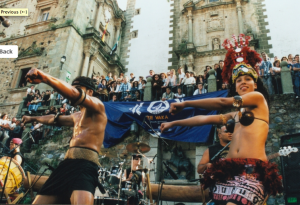 They were scheduled on to
the inaugural Womad festival in Auckland in early '97 and an expanded
Te Vaka - which first performed as a four-piece in Henderson in '94 -
embarked on their first international tour that May. Julie sent
videos and music tapes to European promoters and had to make advance
phonecalls for bookings in the middle of the night.
They were scheduled on to
the inaugural Womad festival in Auckland in early '97 and an expanded
Te Vaka - which first performed as a four-piece in Henderson in '94 -
embarked on their first international tour that May. Julie sent
videos and music tapes to European promoters and had to make advance
phonecalls for bookings in the middle of the night.
Supported by a $30,000 Creative New Zealand grant which covered airfares, they discovered the realities of life on the road which, if nothing else, meant feeding 14 people three times a day for three months.
"We almost pulled it off," says Julie, "and just covered costs but that was largely because the band weren't getting paid. That first year blew us completely out, we had no idea what we were in for. The first show in Switzerland people just swamped the stage, there was so much excitement. Every time we had to do three encores."
"And we'd only done one album so had no encore songs," says Opetaia. "We had to play some songs again and hope no one noticed."
The audience responses kept them going and at shows they would sell copies of the album, which covered publicity.
Opetaia: "That first tour was so demanding because I had the task of pulling off a good show every time, and we'd been really chucked in the deep end on huge stages when we were really trying to find our feet. We were still schooling the group and didn't really know ourselves what we trying to do, but knew we were trying to develop something."
Some members of the group were family, including cousin and singer Sulata who had a solo album in '96, which made things easier.
"To survive on the road," says Opetaia, "family connections really helped because instead of people doing things on their own they felt more of a group. It's an island thing, whoever is the oldest is the one you respect and is in charge and hopefully he's a good person.
"Also you don't see people over there with fuzzy hair and brown faces so we are easily recognisable. I had to pound into them that we have a behaviour thing we have to look after because we were representing a bigger picture."
 At night Opetaia would
review the performances which Julie had videoed, looking to tighten
the show and telling band members when they hadn't performed well or
had pulled a face when something had gone wrong rather than smile
their way through.
At night Opetaia would
review the performances which Julie had videoed, looking to tighten
the show and telling band members when they hadn't performed well or
had pulled a face when something had gone wrong rather than smile
their way through.
These were never personal criticisms but were to improve Te Vaka, and it's a practice they still observe. They concede also that within Polynesian culture, self-effacement is valued over the self-confidence often necessary in the performing arts.
Te Vaka members are repeatedly encouraged to see that being the best is something to aim for, not to shy away from.
As a baptism of fire those first performances in Europe worked and they became increasingly professional and confident as the tour progressed - but then they came home. It was like hitting a wall.
Julie: "We were really depressed because we felt all the doors had immediately closed as soon as we flew into Mangere. We'd had so much validation and excitement I didn't want to be here. All the connections were over there. Here we felt totally isolated, so I just started work immediately on another tour."
With sponsorship from Air New Zealand they went on the road for five months through Europe in '98, playing music from their second album to even greater success.
And that has been the way of it since: annual overseas tours and each new album more finely honed than the last. This year is quiet, just performances in Hawaii so far and more to come in Fiji and Samoa. They plan to develop a new show but mostly they will settle back home with their four children, who travel with them. In October, Julie will present the band at the Womex music trade fair in Germany.
This year is a breathing space in the journey.
"Right from the beginning," says Opetaia, "we've always had this target of doing something musically ... for this area. I want to sit in Paris or somewhere and have someone say, 'Hey, that's Pacific music' and recognise it straight away. It is something that can go across to other cultures."
Julie: "Although we've gone a long way, there's lots more to do. In '97 we thought, 'We're going to do it' and then after could have thought, 'We've done it'. But it's just kept on growing."
Opetaia: "And being on this path you realise, 'Man, you've hardly even started and there's a long way to go'. I'm hoping more people will get on this path because somewhere in a school somewhere are kids who are going to take it even further."


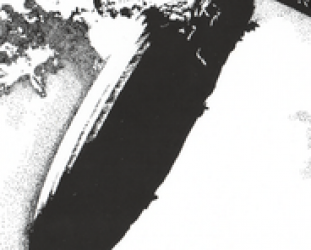
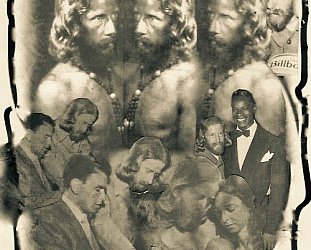

post a comment